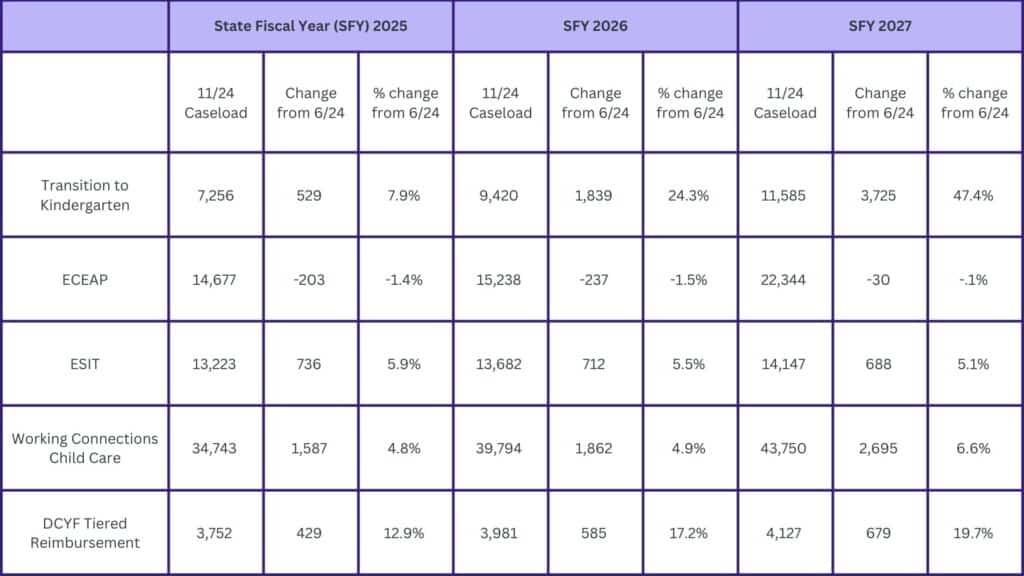
The Capitol building on a mild Winter day.
(Photo Credit: Erica Hallock)
Trivia is Back!
How many balls did former Washington Governor Dixy Lee Ray hold to commemorate her inauguration in 1977?
Breaking News – Governor-Elect Ferguson Releases Budget Priorities for 2025-27
As we were going to “press,” Governor-Elect Ferguson released a 14-page document outlining his budget priorities for 2025-27. We will be reviewing the proposals in detail and provide a thorough review in next week’s Notes from Olympia, but did want to share highlights of his proposal for Working Connections Child Care.
Per the Fair Start for Kids Act of 2021, income eligibility for Working Connections Child Care is slated to rise from 60% of the State Median Income to 75% of the State Median Income on July 1, 2025. In his proposed budget, Governor Inslee proposed delaying that expansion until the 2029-31 biennium to save $296 million.
Governor-Elect Ferguson proposes a modified approach to this expansion at a cost of $100 million. Under the Ferguson proposal, families with a household income up to 75 percent of the State Median Income and where one parent works for a small business would be eligible for Working Connections Child Care. The proposal does not define small business.
What’s on Deck for Week One?
The first week of the legislative session will be a mix of pomp and circumstance; grounding and orientation; and getting down to business! Simply put – no one is easing gently into the 2025 legislative session.
Saying Goodbye and Welcoming New Leaders
Starting out the week, newly elected (and re-elected) legislators will be sworn in on Monday, Jan. 13th at 12:00 p.m.
Incoming Governor Ferguson will be officially sworn in on Wednesday, Jan. 15th at 11:30, followed by his inaugural address. (And, per this week’s Trivia, the party celebrating his inauguration will be Wednesday evening).
Before the incoming Governor assumes the office on the second floor of the Legislative Building, outgoing Governor Jay Inslee will provide his final State of the State Address on Tuesday, Jan. 14th at 10:30 a.m. Both of these addresses will be made before a joint session of the Senate and House of Representatives.
Legislative Committee Work Begins
Legislative committees released their schedules for the first week and they are getting down to business right out of the gate.
Budget Hearings
Senate Ways and Means, House Appropriations and the House Capital Committee will accept public testimony on Governor Inslee’s proposed Operating and Capital budgets throughout the week. The respective Transportation Committees will also be accepting public testimony on the proposed Transportation budget. Note that these budget hearings are very full, so testimony is typically limited to 60 seconds. Virtual testimony is available, and written testimony is accepted up to 24 hours after the start of the hearing.
- Operating Budget: Senate Ways and Means Committee will hear testimony on the proposed Operating Budget on Tuesday, Jan. 14th starting at 4:00 p.m. You can sign up to provide oral or written testimony here. The House Appropriations Committee will hold its public hearing on Monday, Jan. 13th starting at 4:00 p.m. You can sign-up to provide oral or written testimony here.
- Capital Budget: Senate Ways and Means Committee will hear testimony on the proposed Capital Budget on Monday, Jan. 13th starting at 4:00 p.m. You can sign-up to provide oral or written testimony here. The House Capital Budget Committee will hold its public hearing on Thursday, Jan. 16th starting at 1:30 p.m. You can sign-up to provide oral or written testimony here.
Here is a refresher as to what was included in Governor Inslee’s budget as related to early learning.
Work Sessions
Both the Senate and House early learning related policy committees are scheduled to hold early learning related work sessions on Tuesday, Jan. 14th. Work sessions are informational presentations where invited guests come before committees to educate committee members on specific topics. Public testimony is not accepted at work sessions, and the committees do not take any action on the topic.
On Jan 14th, the Senate Early Learning and K-12 Committee is holding a work session at 8:00 a.m. focused on updates on implementation of the Fair Start for Kids Act and an overview of the Cost of Quality Care Rate Model. At 1:30 the same day, the House Early Learning and Human Services Committee will hold a work session providing an overview of child care and early learning programs.
We will recap these work sessions in next week’s Notes from Olympia.
Bill Action
Finally, some committees will be not only holding public hearings, but also executive sessions (votes) on bills. For example, on Jan. 14th, the Senate Early Learning and K-12 Committee will hold a public hearing on SB 5130 (Sen. Claire Wilson) which would permanently eliminate child care licensing fees. Want to provide oral or written testimony on this bill? Sign in here.
Bills, Bills, Bills
In our state, legislators can “pre-file” bills the month before the legislative session begins. These pre-filed bills are then introduced – and considered “real” bills – on the first day of the legislative session.
It is always interesting going through the pre-filed bills. Here’s one that caught my eye – SB 5159 by Sen. Sharon Shewmake would establish a “Trick or Treat Day.” In essence, Sen. Shewmake is trying to get our state to collectively trick or treat on a Friday or Saturday evening. Fascinating, right??? Even though my children are grown, I can see the appeal.
Start Early Washington will produce an updated bill tracker on a weekly basis containing relevant early learning and other bills of interest. This bill tracker lives on our website so you can reference it at any time, it will be updated every Thursday, and it will be linked weekly in this newsletter. Feel free to flag if there are any bills we are missing.
We will provide a more thorough review of pertinent legislation in upcoming editions of this newsletter.









